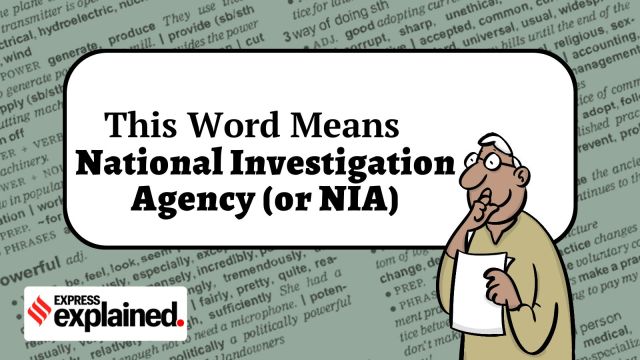This Word Means: National Investigation Agency or NIA
Every day, 500 words on a word (or expression) that has appeared in The Indian Express.
 The NIA Act was enacted in 2008, the year of the deadly 26/11 terror attacks on Mumbai.
The NIA Act was enacted in 2008, the year of the deadly 26/11 terror attacks on Mumbai.WHY NOW?
The National Investigation Agency (NIA) on Sunday (April 27) began the process of taking over the investigation of the Pahalgam terror attack that killed 26 people last week, following orders from the Union Ministry of Home Affairs (MHA).
Overseen by a Deputy Inspector General of Police (DIG), Inspector General of Police (IG) and Superintendent of Police (SP) from the anti-terror agency, the NIA teams are questioning eyewitnesses and searching for evidence.
WHAT IS THE NIA?
Following several terror attacks in India over the years, various expert committees have recommended a specialised Central agency to investigate these cases. Notably, the other key central agency, the Central Bureau of Investigation (CBI), mainly investigates corruption cases, economic offences and other serious organised crimes.
As the official NIA website states, terror cases often involve “complex inter-State and international linkages, and possible connection with other activities like the smuggling of arms and drugs, pushing in and circulation of fake Indian currency, infiltration from across the borders, etc.”
The NIA Act was thus enacted in 2008, the year of the deadly 26/11 terror attacks on Mumbai. It created an agency to “investigate and prosecute offences affecting the sovereignty, security and integrity of India, security of State, friendly relations with foreign States”, and actions violating existing Acts and international treaties.
As of February 2020, the NIA registered and investigated 315 cases. After submission of charge sheets, 60 cases were finally or partially decided in trial. Of these, 54 cases have ended in conviction.
WHAT IS THE JURISDICTION OF THE NIA?
The NIA Act, amended in 2019, lists the offences the agency is empowered to investigate under a schedule. These include offences covered under sections of the criminal code, the Information Technology Act and the Arms Act, the Anti-Hijacking Act, among others.
However, in December 2024, the Supreme Court held that it also has the power to investigate offences “connected” to the main Scheduled Offence already under investigation — even if it was committed by a separate person not accused in the Scheduled Offence.
Further, if the Central government believes that a Scheduled Offence has been committed and is to be investigated under the Act, it may, suo motu (on its own), direct the agency.
The Centre can also receive reports from state governments for such cases. Within 15 days from receipt of the report, and after collecting relevant information, it can decide whether the offence is a Scheduled Offence and fit for the NIA to investigate. Under the Act, “The State Government shall extend all assistance and co-operation to the Agency for investigation of the Scheduled Offences.”
NIA cases are tried at NIA courts. Under the Act, “The Central Government shall, in consultation with the Chief Justice of the High Court, by notification in the Official Gazette, for the trial of Scheduled Offences, designate one or more Courts of Session as Special Court for such area or areas, or for such case or class or group of cases, as may be specified in the notification.”
Currently, Sadanand Vasant Date, an IPS officer of the 1990 batch of the Maharashtra cadre, heads the NIA as its Director General.



- 01
- 02
- 03
- 04
- 05


































